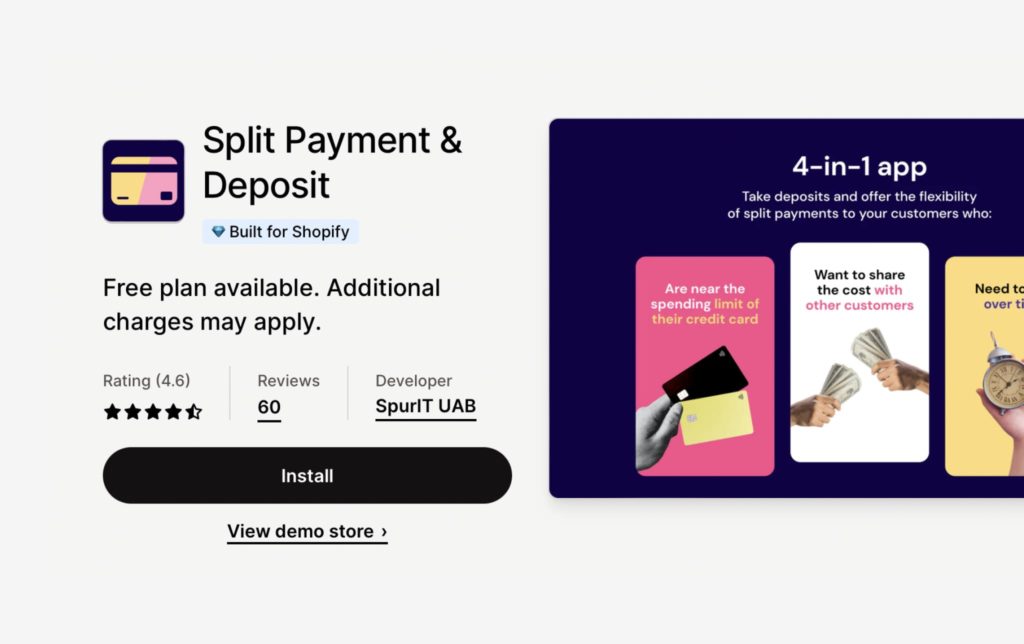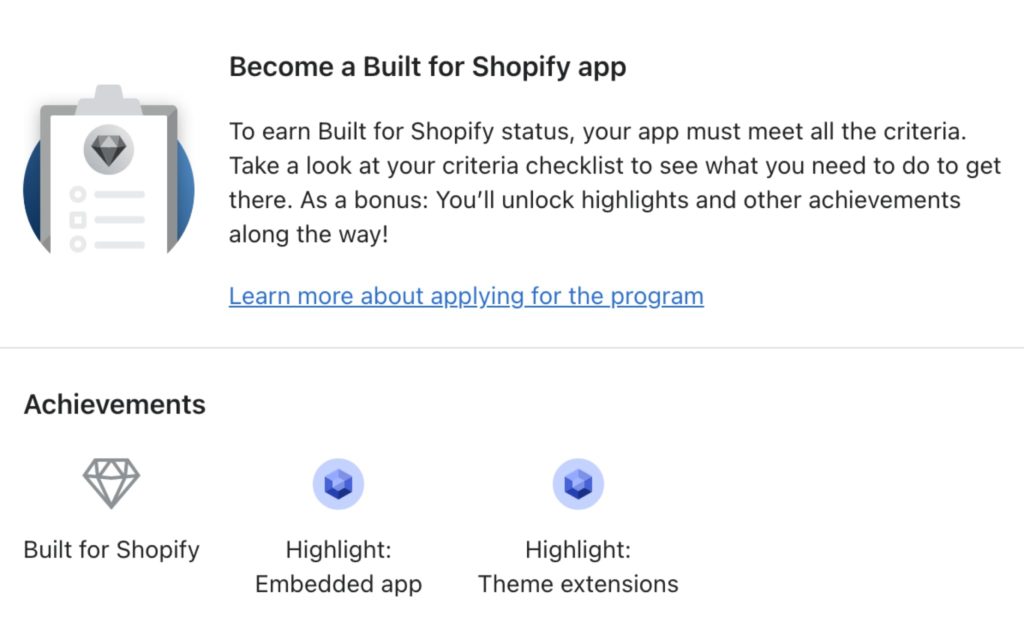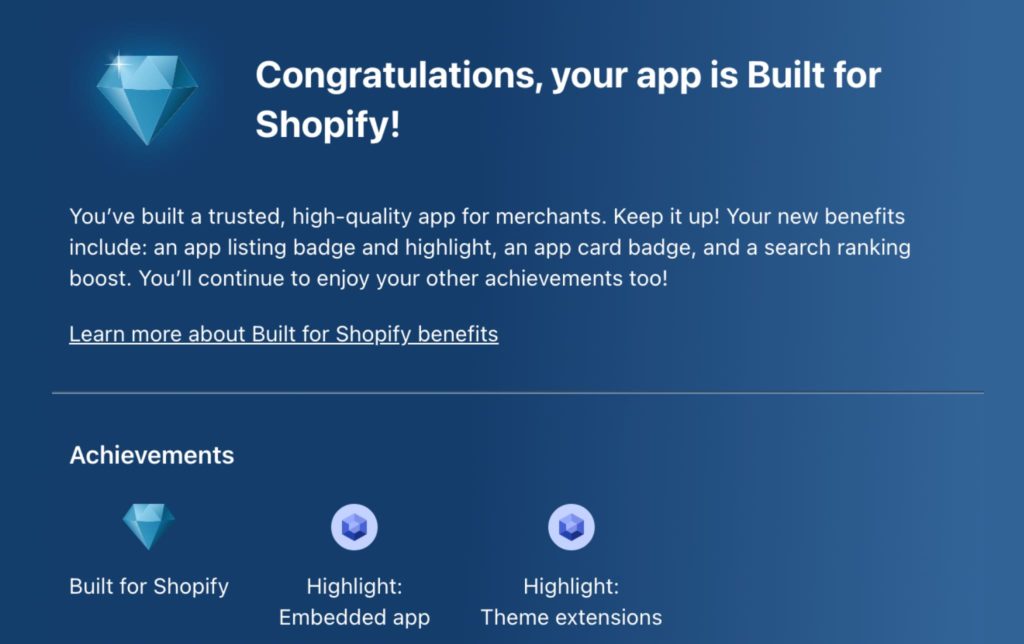
In recent years, the Shopify App Store has exploded in popularity. Now, it counts over 8,500 apps, and this number is only growing.
As the Shopify app market becomes more crowded, it is becoming increasingly important for app developers to stand out. One of the latest ways to do this is to get the Built for Shopify badge.
In this article, I’ll discuss the benefits and challenges of getting the Built for Shopify badge, as well as which apps are easier to get. I’ll also provide some insights about our own experience of getting this badge.
Let’s dive in!
- What is Built for Shopify?
- The benefits of being Built for Shopify
- Is it hard to get the Built for Shopify badge?
- Which apps are easier to get the Built for Shopify badge for?
- Time required to get the Built for Shopify badge
- Will every app get a Built for Shopify status?
- Outlook for the Built for Shopify program
What is Built for Shopify?
First things first, what is Built for Shopify? Built for Shopify is Shopify’s new program that recognizes apps that meet the highest standards for quality, design, and performance. These apps will receive preferential placement in the Shopify App Store search rankings, a special badge on their app listing, and promotion opportunities in high-converting Shopify surfaces.
Currently, out of the over 8,500 Shopify apps available on the official app store, only nearly 71 have the Built for Shopify badge. This means that only a small percentage of developers have achieved the Built for Shopify app badge.
The benefits of being Built for Shopify
Yes, there are a number of advantages to having the Built for Shopify badge. Shopify itself lists the following:
- Search boosts: Built for Shopify apps get preferential placement in Shopify App Store search rankings, so your app listing will get more visibility and stand out from the competition.
- Easy-to-spot badge: A Built for Shopify badge on your app is a simple indicator for merchants to quickly recognize apps that are high quality.
- Promotion opportunities: Built for Shopify apps are eligible for promotion in high-converting Shopify surfaces, such as the Shopify App Store homepage and the recommended apps section of the Shopify admin.
In our experience, we have seen a significant increase in conversion rates since we received the Built for Shopify badge. This is especially true in categories where competition is still low. When merchants see an app with the Built for Shopify badge, they know that it has been vetted by Shopify and is likely to be a high-quality app. This gives our app a significant advantage over the competition and helps us to convert more users.
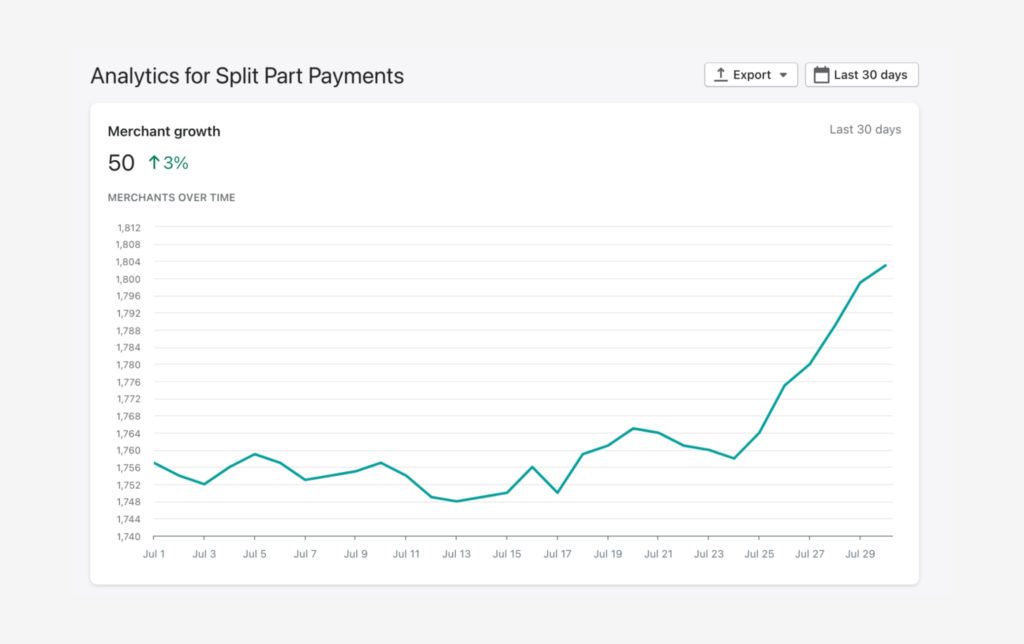
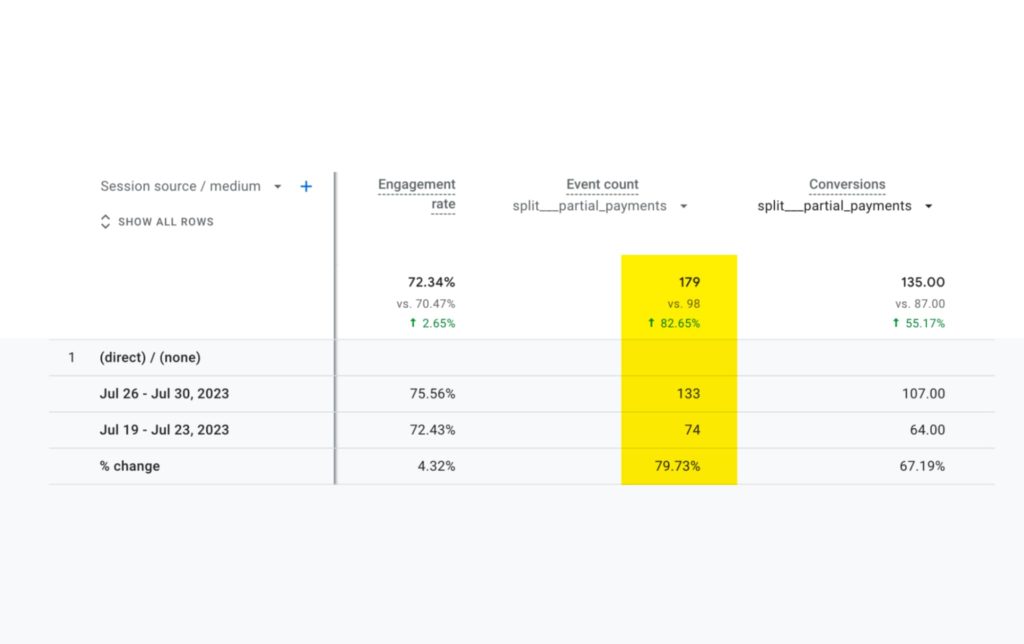 Of course, the Built for Shopify badge is not the only factor that affects conversion rates. Other factors, such as the quality of your app and your marketing efforts, will also play a role. However, the Built for Shopify badge can give you a significant advantage over your competitors.
Of course, the Built for Shopify badge is not the only factor that affects conversion rates. Other factors, such as the quality of your app and your marketing efforts, will also play a role. However, the Built for Shopify badge can give you a significant advantage over your competitors.
Real-world gains from similar experience
While the benefits of the achievement have only been announced in writing so far, they are not obvious to everyone. However, I can share a similar experience. A year and a half ago, one of our apps, Sales Countdown Timer Bar, was included in the Trending App section on the Shopify App Store. This resulted in a significant increase in traffic to our app, as it was featured in many places on the store, such as the block with recommended apps and on the main page.
If the Built for Shopify achievement is featured in a similar way, it will be a major advantage for developers.
Is it hard to get the Built for Shopify badge?
It used to be difficult to get the Built for Shopify badge, but it is now easier thanks to the documentation that Shopify provides. In the past, Shopify would only send invitations to apps that met their requirements. However, now any app that meets the minimum requirements can apply for the badge.
To qualify for the Built for Shopify badge, apps must meet the following requirements:
- They must be embedded in the Shopify ecosystem, not in their own design.
- They must support the Theme app extension OS 2.0.
- They must meet the performance requirements set by Shopify.
In the past, there were more achievements that apps needed to complete qualify for the Built for Shopify badge. However, Shopify has since simplified the requirements to make it easier for app developers to qualify. This is good news, as it makes it more likely that their apps will be able to earn the Built for Shopify badge.
As an example, we just submitted one of our apps for an achievement. The screenshot below shows a checklist of the requirements that the app must meet to qualify for the achievement. In this case, the app has met all of the requirements except for LCP (Largest Contentful Paint). However, we are currently working on improving its LCP performance, so the app will likely qualify for the achievement soon.
Here is an example of what the Built for Shopify badge looks like:
The main challenge: speed
The speed requirement is the most difficult challenge to meet for the Built for Shopify badge. Shopify has rolled out some very demanding numbers in this area.
For example, the LCP requirement is 2.5 seconds. This means that the largest block on the page must load in 2.5 seconds or less. This can be difficult to achieve for apps that have a lot of content or images.
Another challenge is that Shopify requires apps to use special banners to notify merchants about the status of the app. These banners must be displayed at the top of the page, above all other content. This means that the app must wait for a response from the Shopify API before it can display the banner. This can add an additional delay of 2 seconds or more.
The speed requirement also depends on the device that the merchant is using and the speed of their internet connection. If the merchant is using a slow device or has a slow internet connection, it will take longer for the app to load.
This means that apps that are designed to be used on mobile devices or by merchants with slow internet connections will have a harder time meeting the speed requirement.
Shopify is striving for all apps to load in a fraction of a second, but they do not currently segment apps in any way. This means that apps with minimal customization and no front end will have an easier time meeting the speed requirement than apps with a lot of content or images.
Apps that cannot be embedded, such as apps that have their own functionality, design, or brand book, will also have a harder time meeting the speed requirement. These apps will likely not even try to get the Built for Shopify badge until Shopify announces more benefits for doing so.
Which apps are easier to get the Built for Shopify badge for?
The complexity of getting the Built for Shopify badge will depend on the app itself. Apps that are more backend-focused and do not have a front end or widget will be easier to get the badge for. This is because theme app extension is easier to implement for these types of apps, and the embedded achievement is also easier to get.
However, large apps that have a lot of functionality and use end-to-end login will be more difficult to get the badge for. This is because they will need to be translated into embedded format, and Shopify has very strict guidelines for this. For example, apps can only have 6 menu items.
Many complex apps or all-in-one apps that perform many tasks will find it extremely difficult to migrate their interface to the embedded format. This is because the UI will need to be redesigned to fit within the Shopify guidelines. Additionally, apps with complex widgets will need to be integrated with theme extensions. This can be a complex process, especially for widgets with a lot of settings.
For example, we have a complex app RecurringGO! that would be difficult to get the Built for Shopify badge for. RecurringGO! is a subscription management app that allows merchants to create and manage recurring billing plans for their products and services. The app has a lot of functionality, including the ability to create custom billing plans, track customer subscriptions, and send automated reminders to customers.
RecurringGO! would be difficult to get the Built for Shopify badge for because it has a complex user interface and a lot of settings. The app would need to be redesigned to fit within the Shopify guidelines, and it would need to be integrated with a theme extension. This would be a complex and time-consuming process.
In general, apps that are more simple and have a smaller feature set will be easier to get the Built for Shopify badge for. However, even simple apps will need to be redesigned to fit within the Shopify guidelines. If you are developing an app for Shopify, it is important to factor in the time and effort required to get the Built for Shopify badge.
Time required to get the Built for Shopify badge
It took us an average of 70 hours to get the theme app extension achievement for our Split Payment & Deposit app, and 50 hours for the embedded app and speed achievements.
The time it takes to get the Built for Shopify badge will vary depending on the complexity of the app. However, our experience shows that it can take a significant amount of time and effort to get all three achievements.
Will every app get a Built for Shopify status?
No, not everyone will get Built for Shopify. For example, there are multi-platform apps that run on other platforms. These apps tend to have their own unique design, as they have their own shared account and often allow you to use several different platforms within one store or multiple stores. This gives you your own ecosystem within other ecosystems.
For these apps to move everything to the embedded option would mean cutting off that part of their functionality that they’ve already had for years. From Shopify’s point of view, this is okay. But if these apps are not just working for the Shopify market, they probably won’t migrate to the embedded option. Or they might do a simplified version, like a frame, but nothing more than that. There are already some apps like this that have received the Built for Shopify achievement. However, these apps are not as fully featured as the original versions.
Among the major apps, after the announcement, only 2-3 apps received the achievement. These are all major apps with millions of dollars of investment. They have chosen to remain in their own interface and have not yet tried to migrate to the embedded option.
Overall, it seems that only a small percentage of apps will receive the Built for Shopify achievement. This is because the requirements are very strict and many apps will not be able to meet them. However, the achievement does offer some significant benefits, such as increased visibility and improved performance. So, it is still worth considering for apps that are able to meet the requirements.
Outlook for the Built for Shopify program
Shopify has not yet announced any specific plans for the future of the Built for Shopify program, but it is clear that they are committed to making it a valuable asset for developers.
It is possible that they will create a separate category or section for Built for Shopify apps on the Shopify App Store. It could also be that they will simply give Built for Shopify apps preferential ranking in search results.
One of the possibilities is that the Shopify App Store will be divided into two sections: one part for Built for Shopify apps and one part for all other apps. This would allow merchants to easily find and install Built for Shopify apps, which could lead to increased adoption of the program.
Whatever the case may be, it is clear that the Built for Shopify badge is a valuable asset for developers who want to grow their app business. If you are a Shopify app developer, I encourage you to learn more about the Built for Shopify badge and to consider applying for it.
I hope this article has been helpful in addressing any concerns you may have had about the Built for Shopify badge. If you still have any doubts or questions, please contact our team of experts.
